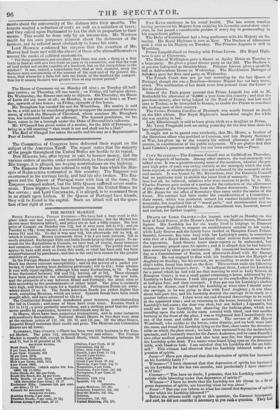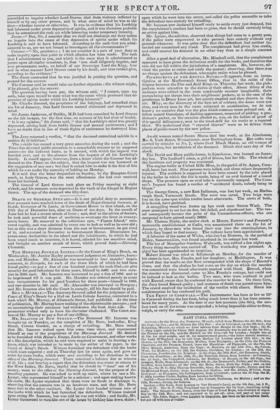DEATH or LORD GRAVE s.—An inquest was held on Monday
on the body of Lord Graves at the Mason's Arms Tavern, Maddox Street, Hanover Square. His Lordship has for six weeks lived in lodgings in Hanover Street, from inability to support an establishment suitable to his rank ; while Lady Graves and the family have resided at Hampton Court Palace. Scandal, however, has been busy with her Ladyship's name, in connexion with that of a Royal Duke, and has found other motives than economy for the separation. Lord Graves knew these reports to be unfounded, but their currency preyed upon his spirits ; and it is alleged that he had latterly been annoyed by some gross caricatures. He transacted business on Satur- day as a Commissioner of Excise, and afterwards dined with Sir George Murray. He was engaged to dine with his brother-in-law the Marquis of Anglesey on Sunday; but his servant, on proceeding to assist at his Lord- ship's toilet, found him dead on the floor. This servant made the following statement to the Coroner's Jury. "At half-past three, I asked his Lordship for a parcel which he had told me that morning to send to Lady Graves' at Hampton Court ; it was a small parcel containing a letter, addressed by his Lordship to Lady Graves. I took this parcel to the coach-office in Piccadilly, at half-past four, and then returned. I then put out his Lordship's clothes to dress for dinner, and I asked his Lordship at what time I should order the carriage, as he was going to dine with Lord Anglesey ; it was then about half-past five, and his Lordship desired the carriage to be ready at a quarter before seven. I then went out and directed the carriage to be ready at the appointed time ; and on returning to the house, instantly went to his Lordship's bed-room • the door was shut, but not locked ; I opened it, but could not see his I:ordship, but observing the looking-glass' which was standing upon the table in the room covered with blood, and two candles burning at the front of the glass, I was so frightened that I immediately ran out of the room and called for assistance. The servant of Mr. Henry Wombwell, who resides in the house, came directly, and we both went into the room, and found his Lordship lying on the floor, close under the dressing- table on which the glass stood ; we both then retreated from the melancholy spectacle, and I instantly went for Sir James Anderson, and he came directly; two other medical gentlemen had also been sent for, but they pronounced his Lordship quite dead. Two razors were found lying open on the dressing. table, with blood on both. I am satisfied that his Lordship did the act him- self." This witness had observed that his Lordship laboured under a de- pression of spirits.
Juror—" Have you observed that that depression of spirits has increased on his Lordship lately ? " Witness--" I have observed that that depression of spirits has increased on his Lordship for the last two months, and particularly I have observed it bf late."
Coroner—" You have no doubt, I presume, that his Lordship committed suicide while labouring under that depression of spirits ?"
Witness—" I have no doubt that his Lordship cut his throat in a fit of great depression of spirits, not knowing what he was about."
Juror—" But can you inform us what has caused that depression of spirits under which his Lordship laboured ?" Before the witness could reply to this question the Coroner interposed, and said, he did not consider it necessary to put st:ch a question. They had assembled to inquire whether Lord Graves died from violence inflicted by himself or by any other person, and in what state of mind he was at the time—whether insane or otherwise. It was in evidence that his Lordship had laboured under great depression of spirits, and it was therefore probable that he committed the rash act while labouring under temporary insanity. Juror—" But, Sir, I consider that we shall not discharge our duty unless we inquire into the cause of that depression of spirits under which his Lordship is said to have laboured. According to the oath that you admi- nistered to us, are we not bound to investigate all the circumstances ?"
Coroner—" No, gentlemen ; I do not consider it a part of your duty to make inquiry upon that point to which allusion has been made. The oath that I administered to you, and which is the same that is administered to jurors upon all similar occasions, is, that you shall diligently inquire, and true presentment make, on behalf of our Sovereign Lord the King, how and in what manner Lord Graves came by his death, and true verdict give, according to the evidence.' " The Juror contended that he was justified in putting the question, and pressed for the answer. The Coroner said he would raise no further objection : the witness might, if he pleased, give the answer. The question having been put, the witness said, " I cannot, upon my oath, take upon myself to state what was the cause which produced that de- pression of spirits under which his Lordship laboured." Mr. Charles Renaud, the proprietor of the lodgings, had remarked since the 1st of January, that Lord Graves seemed abstracted awl depressed in mind.
Sir James Anderson, of Dublin, M.D. had been consulted by Lord Graves on the 4th instant, for the first time, on account of his bad state of health. "It is my opinion," Sir James said, "that his Lordship's mind was greatly depressed, arising both from bodily disease and mental excitement; and I have no doubt that in one of those flights of excitement he destroyed him- self."
The Jury returned a verdict, "that the deceased committed suicide in a sudden fit of delirium."
The suicide has caused a very great sensation,during the week ; and the Times has directed public attention in a remarkable manner to its supposed causes—to the indecent haste, as it seemed, with which the inquest was hurried over, and to the absence from the inquest of all his Lordship's family. It would appear, however, from a letter which the Coroner has ad- dressed to the Times on the subject, that the inquest was not hastened at the suggestion of any one ; but that it suited him to make it the first of five which he was under the necessity of holding -on Monday.
It is said that the letter despatched on Sunday, by the Hampton Court coach, to Lady Graves, was the most affectionate she had ever received from her husband.
The funeral of Lord Graves took place on Friday morning at eight o'clock, and his remains were deposited in the vault of the Chapel in Regent Street. The age of the deceased Wils fifty-four.



















 Previous page
Previous page